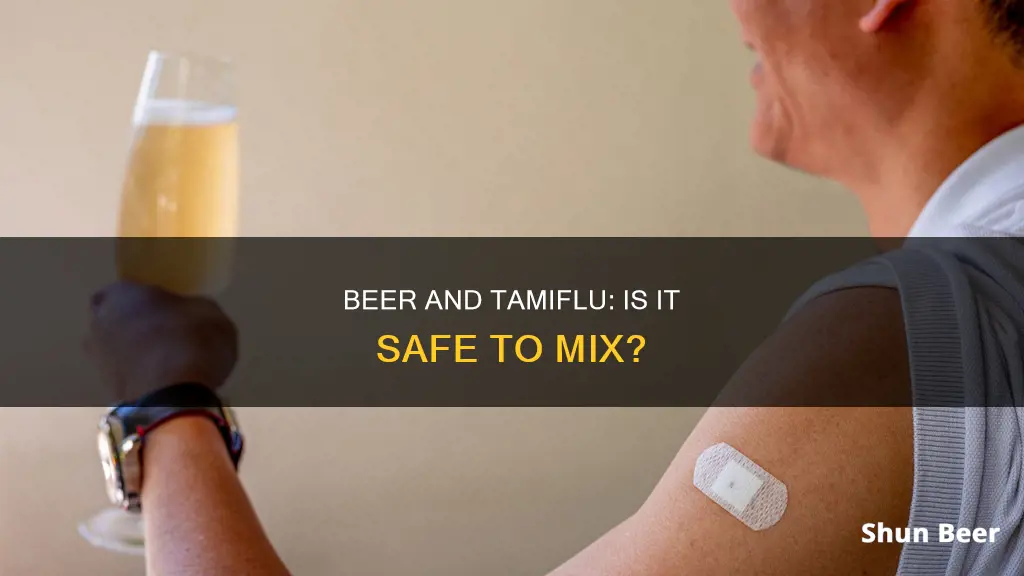
While there is no direct interaction between Tamiflu and alcohol, consuming alcohol while on Tamiflu is not recommended. Alcohol can decrease immune function, worsen side effects of Tamiflu, and impair the body's natural ability to heal itself. Additionally, mixing alcohol with over-the-counter cold and flu medications can have dangerous interactions and side effects, such as increased dizziness, drowsiness, and risk of respiratory depression. Therefore, it is generally advised to avoid alcohol when taking any kind of medication, including Tamiflu, to ensure a safe and effective recovery.
| Characteristics | Values |
|---|---|
| Direct interaction between Tamiflu and alcohol | No direct interaction |
| Effect of alcohol on flu symptoms | May worsen symptoms |
| Effect of alcohol on medication side effects | May worsen side effects |
| Effect of alcohol on recovery | May prolong recovery |
| Effect of alcohol on the immune system | May weaken the immune system |
What You'll Learn
- Tamiflu and alcohol do not interact but alcohol can weaken the immune system
- Drinking alcohol while fighting an infection is not wise
- Alcohol can worsen flu symptoms and medication side effects
- Alcohol can dehydrate you and worsen flu symptoms
- Alcohol can have dangerous interactions with over-the-counter cold and flu medications

Tamiflu and alcohol do not interact but alcohol can weaken the immune system
Tamiflu is an antiviral medication used to treat influenza, more commonly known as the flu. It is most effective when taken within 48 hours of the start of symptoms, reducing their duration by about 24-32 hours. Common side effects include headache, nausea, vomiting, and diarrhea.
Alcohol does not directly interact with Tamiflu, meaning it will not affect how well the medication works. However, consuming alcohol while recovering from an illness like the flu is generally not recommended. Alcohol can decrease immune function, making it harder for your body to fight off the infection. It can also worsen certain side effects of Tamiflu, such as nausea, vomiting, and headaches. In addition, alcohol can cause dehydration, interrupt normal sleep, and hinder the body's natural healing process.
Alcohol can also have dangerous interactions with over-the-counter cold and flu medications, including cough suppressants and antihistamines. Combining these medications with alcohol can increase side effects such as dizziness, drowsiness, impaired coordination, and risk of liver damage or other serious health issues.
Therefore, while there is no direct interaction between Tamiflu and alcohol, it is generally not advisable to consume alcohol while taking Tamiflu and recovering from the flu. It is important to stay well-hydrated, get plenty of rest, and allow your body's immune system to fight off the infection.
Beer and Studying: Mixing Alcohol and Academic Success?
You may want to see also

Drinking alcohol while fighting an infection is not wise
Drinking alcohol while taking Tamiflu is not recommended. While there is no direct interaction between Tamiflu and alcohol, consuming alcohol can weaken your immune system and may worsen side effects from Tamiflu, such as nausea, headaches, and vomiting.
More generally, drinking alcohol while fighting an infection is not wise. Alcohol can decrease immune function, making it harder for your body to fight off the infection. It can also lead to dehydration, interrupt normal sleep, and hinder your body's natural ability to heal itself. This means that it may take longer for you to recover from the infection.
Additionally, alcohol can affect your mood and energy levels. It is a central nervous system depressant that slows down parts of the brain and impairs cognitive function. It can lower serotonin levels in your brain, which can lead to anxiety, stress, and low mood.
Alcohol can also cause liver damage, especially when combined with certain medications. It is important to be cautious and speak to a healthcare professional if you have any concerns about drinking alcohol while taking medication or fighting an infection.
Overall, it is best to avoid drinking alcohol while fighting an infection to give your body the best chance to recover and heal.
Drinking Beer in Ads: Is It Legal?
You may want to see also

Alcohol can worsen flu symptoms and medication side effects
While there is no direct interaction between Tamiflu and alcohol, consuming alcohol while on Tamiflu is not recommended. Alcohol can decrease immune function and worsen flu symptoms and side effects of Tamiflu, such as headache, nausea, and vomiting.
Alcohol can impair the immune system, making it harder for your body to recover from an illness. It can also have dangerous interactions with over-the-counter cold and flu medications. For example, combining alcohol with cough suppressants and antihistamines can increase side effects like dizziness, drowsiness, impaired coordination, and difficulty concentrating. In more severe cases, this combination can lead to respiratory depression (slowed or stopped breathing), feelings of dissociation, brain lesions, epilepsy, or permanent psychosis.
Additionally, alcohol can worsen dehydration, a common concern when experiencing flu-like symptoms. Dehydration can further weaken your body and prolong your recovery. Alcohol can also interfere with your sleep, which is crucial for healing and recovery.
It is generally advisable to avoid alcohol when taking any medication for colds, flu, pain relief, or sleep aids. This is because alcohol can increase the side effects and risk of liver damage or other serious health issues. Instead, it is recommended to get plenty of rest and drink at least eight to ten cups of liquids (8 ounces each) per day when recovering from an infection.
Beer and Gleevec: A Safe Mix?
You may want to see also

Alcohol can dehydrate you and worsen flu symptoms
Alcohol can have a dehydrating effect on the body, which can worsen flu symptoms and prolong recovery. Dehydration can make congestion worse, and it is important to stay well-hydrated when recovering from an infection. Flu symptoms such as fever, body aches, and tiredness can be intensified by alcohol consumption, which can also cause or worsen headaches, nausea, and fatigue.
Drinking alcohol while sick can also weaken the immune system, making the body more susceptible to infection and slowing recovery. Alcohol can also interrupt normal sleep, which is essential for recovery. It disrupts REM sleep, the most restorative type of sleep, and activates alpha activity, which prevents deep sleep.
Additionally, alcohol can interact with some over-the-counter and prescription medications, including common cold and flu medications, leading to dangerous side effects. For example, combining alcohol with acetaminophen can cause liver damage, while mixing it with chlorpheniramine can worsen side effects like drowsiness and nausea.
Therefore, it is generally recommended to avoid drinking alcohol while recovering from an illness like the flu.
Beer and Tamiflu: Is It Safe to Mix?
You may want to see also

Alcohol can have dangerous interactions with over-the-counter cold and flu medications
While there is no specific interaction between Tamiflu and alcohol, drinking alcohol while recovering from an illness is generally not recommended. Alcohol can decrease immune function, impair your immune system, and worsen side effects of Tamiflu like headache, nausea, and vomiting. It is also important to stay well-hydrated and get plenty of rest when recovering from an infection, and alcohol can cause dehydration.
More generally, alcohol can have dangerous interactions with over-the-counter cold and flu medications. For example, combining alcohol with antihistamines like Benadryl can worsen sleepiness and make you feel dizzy, increasing your risk of falling and hurting yourself. Alcohol can also increase the risk of gastrointestinal bleeding when combined with nonsteroidal anti-inflammatory drugs (NSAIDs) such as ibuprofen (Motrin, Advil) and naproxen (Aleve).
Consuming alcohol with pain medications like Advil and Tylenol can lead to adverse health effects including bleeding and ulcers, upset stomach, liver damage, and rapid heartbeat. Alcohol can also intensify the sedating effects of certain medications, making it unsafe to perform tasks such as driving.
It is important to carefully read the labels of any over-the-counter medications and pay attention to any warnings about combining them with alcohol. If in doubt, consult your doctor or pharmacist.
Neoprene Beer Coolers: How Do They Work?
You may want to see also
Frequently asked questions
There is no direct interaction between Tamiflu and alcohol, but drinking alcohol while on Tamiflu is not recommended. Alcohol can decrease immune function and worsen side effects of Tamiflu like headache, nausea, and vomiting.
Common side effects of Tamiflu include headache, nausea, vomiting, and diarrhea.
Drinking alcohol while recovering from an illness is not recommended. Alcohol can dehydrate you and worsen flu symptoms. It can also prolong recovery.
There is no exact rule for when you can drink alcohol after getting the flu shot. But it is recommended to wait until you are feeling back to normal.
Mixing alcohol with cold and flu medication can exacerbate dehydration and worsen symptoms such as nausea, vomiting, and headaches. Alcohol can also impair the immune system and have dangerous interactions with over-the-counter cold and flu medications.







